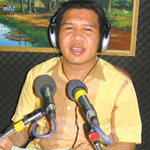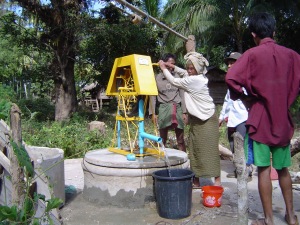We asked radio personalities whose programmes deal with the topic of love to share their ideas on how Cambodian youth can find a place for love in their busy lives and enjoy the benefits of romance without getting hurt in the process. Their responses have been translated from Khmer and edited for clarity and length.
Ek Monosen
Love consultant for Radio FM 102
and vice rector at Human Resources University
Heng Sokchannaroth
Radio personality for radio FM103
Chhy Rotha
Producer of the “Don’t Be Shy”
segment of the “Smile Hopefully”
show on Radio FM100.3
Neang Sovathana
Radio personality for “The Love Show” on Radio FM 106.5
DISCUSSION
Is it possible to be a great student and be in a healthy romantic relationship?
Ek Monosen – There are two possible results to a romantic relationship between students. One is that they will encourage each other to study hard so they will have better results in their studies. However, they also might waste time doing other things to show their love for each other that will cause their grades to drop off. Students who fall in love can be still be good students, but I would say it is rare.
Chhy Rotha – Outstanding students can certainly get involved with a romantic partner. High-performing people need love just like anyone else. The results of falling in love depend on their ability to manage their time. Some people use love as motivation to study harder. I have seen great students who have won scholarships who are in a relationship. They must know what they want out of their relationship. Of course, if they let love control them they will risk falling apart and facing failure.
Heng Sokchannaroth – It depends on our partner. If our partner encourages us to study hard, it is good. But if our partner doesn’t like studying and instead likes going out, we will bump into failure. So, the weight is in our partner. If we have a good partner, we will be more likely to be good.
How do you know if you have met your true love?
Chhy Rotha – People usually have a set criteria for what type of person they want to be with. While you may not be able to find a person who meets all of those criteria, they at least need to fill enough of them to make you happy and allow you to get along well. The closer you get to someone, the more you will know if they might be a person who you can start a family with.
Ek Monosen – Although there is all kinds of new technology in the world, we have yet to develop a thermometer to gauge whether someone is good or bad. The chance that you will meet the love of your life in your youth is slim because when young people fall in love they focus too much on loyalty. There are other factors that must be considered such as age, knowledge, jobs, health, family and other factors that become more important as we grow up. Loyalty is important but it is does not guarantee that your love will last or lead to a happy family.
Heng Sokchannaroth – An honest partner is the one who takes care of us and thinks about us all of the time, but also motivates us to study and work hard. A caring lover would never ask us to go out with him or her if we didn’t want to or had unfinished work.
How can you deal with a broken heart after a tough break up?
Ek Monosen – You have to realise that while you may be in a dark place, you have not died and you will recover. Moreover, people must not think that falling out of love was a failure on their part, it can often be a success because you will no longer waste time with a person who did not treat you the way you deserved to be treated. We can compare dating to learning to walk as a baby. If we stopped trying the first time we fell down we would live our lives unable to walk. You must move on and learn to love yourself again and trust that you will find someone else.
Chhy Rotha – The best way to deal with a broken heart is to avoid being isolated. Try to share your problems with friends and relatives. People who you know will love you no matter what. You should also consider the benefits as well as the disadvantages of the breakup. Write this down on a piece of paper, focusing on how the change will impact upon your future goals academically and professionally. Although it will not take away 100 percent of the pain, staying busy is also an important way to prevent yourself from going into a post-breakup depression.
How do you know if your lover is being loyal and honest with you?
Neang Sovathana – Using me and my boyfriend as an example, we try to as open-minded as possible to each other. So he never tells me a lie. If my boyfriend is interested in someone else, and I have another man on my mind, we can just separate peacefully. We share our personal matters every day. We correct bad points of each other. If he sees that I am making a mistake, he corrects me, and if I see that he is messing up, I correct him too. Only time can tell if someone is loyal or not. Some people like to use sweet words and some don’t, but we should be hesitant to believe what people say until we see how they act.
Chhy Rotha – We can observe his or her actions, as compared with their words. To what level are their sweet words actually matched by sweet action? Loyalty doesn’t just mean you are there, it also means people are willing to share their personal problems with each other.
Ek Monosen – To judge if a person is loyal or not you need at least six months in a relationship. We need to see to what extent they take care of each other. Does your partner aim only to have sex with you or not? Do they keep promises or not? Have they ever told a lie? If you feel like it is time to get married you should make three requests of your potential spouse: have blood tests, spend time at his house and have your marriage officially registered. If your lover does all of these things they are probably honest, but it still doesn’t guarantee a happy life together.
Heng Sokchannaroth – It is difficult to tell whether someone you have fallen in love with is honest in the initial stages of a relationship. The best way to ensure that we are with someone who we can trust is to be patient and do not hurry to make a decision about whether your partner really loves you. What is important is that we take time to observe our partner and then after a while we can make a decision as to how faithful they really are.
By: Dara Saoyuth & LIFT Staffs
This article was published on Lift, Issue 26, July 7, 2010












